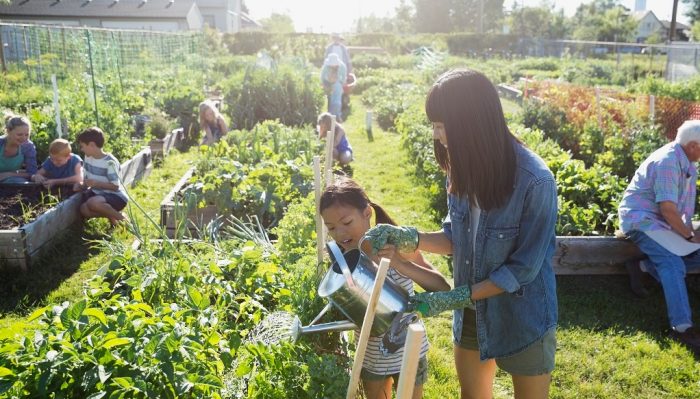Gardening is a fun, healthy habit that every member of the family can enjoy together. Even very young children can be fascinated and engaged by spending a few hours each week in the garden. In fact, gardening is a wonderful way to introduce children to concepts like responsibility and the habits that contribute to a healthy lifestyle.
Get Children Involved in the Beginning
If possible, get kids involved with planting at the very beginning stages. You might consider giving them a small plot of the garden for their very own where they can plant the seeds of their choice. Give them guidance, but also grant them the freedom to make their own experiments. If they choose to drop 10 seeds in a single hole, allow them to do so. Help them to understand that this is their garden plot and that they are responsible for the small living things that are growing there.
As the week’s progress and the seeds begin to sprout, help children tend to the plants on a regular basis. Through this process, children begin to see how their involvement can affect the health and welfare of their garden. Neglect the plants and they begin to wilt. Water them regularly and provide fertilizer, and the plants flourish. Children can easily make a direct connection between their actions and the health of the plants, providing an excellent lesson in responsibility.
Healthy Habits, Happy Children
Many children derive benefits from growing vegetables. Not only do they learn important lessons in responsibility, but they also discover where some of the food they eat every day comes from. There is definitely a sense of pride and satisfaction that comes from being able to snack on carrots, beans or radishes that are homegrown, and it’s a sense to which children are not at all immune. It’s fun for kids to be able to eat something they grew themselves. In fact, many youngsters who are known for avoiding fruits and veggies just might do an about-face when it comes to eating something they grew themselves.
Sunshine and Exercise
In a modern era when even quite young children may be spending increasing amounts of time in front of television and computer screens, gardening represents an opportunity to disconnect and get outdoors with family. Gardening is a real-world, hands-on experience that involves a lot of twisting, lifting, and bending. As such, it provides some extra physical activity that kids may not otherwise get. Being outside also exposes kids to the sun’s rays, providing much-needed vitamin D. Just make certain to provide sunscreen. Too much sun exposure is a sure way to spoil a good day in the garden.
Practicing Patience
Gardening just might be the perfect way to help kids cultivate patience. It’s not unusual these days to expect immediate results in pretty nearly any endeavor. However, gardening is one of those pursuits where rewards are reaped largely by those who persevere over the long haul. Planting seeds, waiting for them to sprout, and then nurturing them as they grow can represent a singular opportunity to help kids understand the value of patience. When flowers are cut and vegetables are harvested, kids experience the rewards of their dedication. It really is a wonderful feeling.
A Little Loss
As the growing season wanes, many plants die or become dormant. This can also be a valuable lesson for kids as they have now participated in a complete lifecycle. They planted seeds, nurtured them through many weeks, and have enjoyed the fruits of their labor. It is now a natural part of the cycle for the plants to die. For many children, this is their first experience of loss, and it is a gentle introduction that helps them to begin to develop valuable coping skills.
A Rewarding Experience
Time spent in the garden is always a quality time when the whole family is involved. Young children love to get dirty, and their natural capacity for nurturing pretty much guarantees that they have green thumbs. Responsibility, the cultivation of healthy life habits, and learning patience are just a few of the many benefits that come from kids spending time in the garden.











Read 0 comments and reply